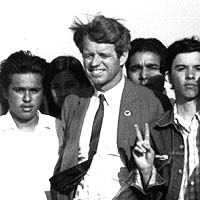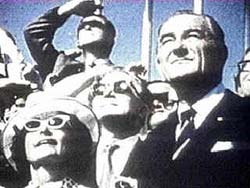HV/Series/Episode/ Work by: Peter Bochan · Barrett Golding · Ann Heppermann · Kara Oehler
![]() Hearing Voices from NPR®:
Hearing Voices from NPR®:
035 1968— Summer of Hate
Host— Barrett Golding of Hearing Voices
Airdates— 10/29/2008 – 11/05/2008
1968 (53:00 mp3):
 It’s another presidential election year; the American people are deeply divided and deeply entrenched in another unpopular war. The topic is not 2008, but 1968. If 1967 was the Summer of Love, maybe 1968 was the Summer of Hate.
It’s another presidential election year; the American people are deeply divided and deeply entrenched in another unpopular war. The topic is not 2008, but 1968. If 1967 was the Summer of Love, maybe 1968 was the Summer of Hate.
We hear Dale Minor report from the battleground during the “Tet Offensive;” part of from Pacifica Radio Archive 1968 Revolution Rewind.
We go live to the “Chicago 1968” DNC demonstrations, mixed by Barrett Golding. (Voices: Martin Luther King, Jr, Robert Kennedy, Edward Kennedy, Chicago Mayor Richard Daley, journalist, police, and demonstrators at Chicago 1968 Democratic National Convention. Music: “Ballad of the Green Beret” by Sgt. Barry Sadler, “For What It’s Worth” original by Buffalo Springfield and cover by The Staple Singers.)
We drink “The Electric Kool-Aid Acid Test,” stirred by producers Ann Heppermann and Kara Oehler. (1968 Tom Wolfe book | 2009 Gus Van Sant film Weekend America “This Weekend in 1968” | Voices: Carolyn Garcia, Mountian Girl” & “Hardly Visible” George Walker | Merry Pranksters)
We hear the songs, speeches, and news reports of the times in “A Shortcut Back to 1968,” sliced by Peter Bochan.
Sez Shortcuts producer:
 An unpopular war was raging overseas, as an unpopular President spoke of his “awesome responsibility” and chose not to seek re-election, while his party fought for a change toward “new policies”, and the crew of Apollo 8 embarked on a journey to the moon.
An unpopular war was raging overseas, as an unpopular President spoke of his “awesome responsibility” and chose not to seek re-election, while his party fought for a change toward “new policies”, and the crew of Apollo 8 embarked on a journey to the moon.
1968 was an election year that brought the assassination of Martin Luther King Jr. and Robert Kennedy. The Vietnam War took a record number of casualties. Many cities burned as people took to the streets against the war and against racism.
The Presidential election process gave way to unprecedented turmoil, with deep divisions in the political parties, including protests at the 1968 Democratic Convention, and riots in the streets of Chicago (leading to the political trials of the “Chicago 8” and the Catonsville 9 for burning draft files in Maryland). It was also a time of intense resistance on college campuses across the country, with battles between hawks & doves, rich and poor, young and old, black and white.
Using only the sounds, music and voices of one of the most explosive and memorable years in history, this 40th Anniversary mix captures a time when America came to a crossroads that almost destroyed the dream and any bridge for that famous “generation gap”.
Featuring “Yippies” Abbie Hoffman, Jerry Rubin, and underground and counter-culture heroes like The Fugs, Cat Mother & The All-Night Newsboys, David Peel & The Lower East Side, the Amboy Dukes, Jimi Hendrix, Sly and The Family Stone, the Rolling Stones, the Band, Mary Hopkins, Marvin Gaye, the Moody Blues, Ennio Morricone, 2001: A Space Odssey, Aretha Franklin, the Beatles, the Monkees, the cast of “Hair”, Simon and Garfunkel, Cream, The Firesign Theater, with Dustin Hoffman, Richard Nixon, Hubert Humphrey, Huey P. Newton, Charlton Heston, Chicago Mayor Richard J.Daley, H.Rap Brown, Stokley Carmichael, Sammy Davis Jr, Eldridge Cleaver, Joe Cocker, Marshall Efron, “Rosko”, Spiro T. Agnew, General Westmoreland, Sen. Ted Kennedy, LBJ and many more.
Recorded and mixed in analogue on a Tascam vintage 4-track, “A Shortcut through 1968” features no narration, it’s message evolves from the careful juxtaposition of the various elements, including airchecks from the archives of WBAI in 1968 (with the voices of free-form radio founders Bob Fass, Steve Post and Larry Josephson) mixed with interviews on “what do you remember about 1968?”
More on Chicago 1968: Summer of Hate:

The 1967 summer of love was followed by the 1968 summer of hate. Really it began New Year’s Day, January 31: the Chinese Lunar New Year’s, called Tet. Breaking the Tet truce, the North Vietnamese launched their largest assault yet, and their first in non-rural areas, staging simultaneous attacks in 5 major cities, 36 provincial capitals, 64 district capitals, and many villages. In Saigon suicide squads stormed the presidential Independence Palace, the radio station, the ARVN’s joint General Staff Compound, Tan Son Nhut airfield, and the United States embassy.
Within a few days, the Americans and South Vietnamese had reclaimed most of Ho Chi Minh’s gain. But the Tet Offensive awoke the American government, and especially the American people to the fact that years of bombing had not had the predicted effect of squashing communist resolve.
In 1968, Memphis public sanitation employees were denied the right to collectively bargain for fair wages and worker’s rights. The Reverend Doctor Martin Luthur King, Jr. went there to help. On April 4, he was shot on the balcony of the Lorraine Hotel. That night 100 cities burned in riots.
Robert F. Kennedy was running for president, and about to address an Indianapolis crowd when he got the news. He made a impromtu moving call for peace. Two months later, Ted Kennedy would deliver his brother’s eulogy. On June 4, in Los Angeles, RFK was shot after delivering his California Democratic Primary victory speech.
And some began to say that threats, or talk about the threats that were out. What would happen to me from some of our sick white brothers? Well, I don’t know what will happen now. We’ve got some difficult days ahead. But it doesn’t matter with me now. Because I’ve been to the mountaintop.”
–Dr. King, Mason Temple, Memphis, April 3, 1968
The 1968 Democratic National Convention was held in Chicago’s International Amphitheatre. It began Monday, August 26. Two days later, so did the riots. Mayor Richard Daley (who the night of Dr. King’s death had issued his police “shoot to kill” orders) had this to say: “The police are not here to cause disorder, the police are here to preserve disorder.”
The evening television coverage juxtaposed Vice-President Hubert Humphrey’s landslide nomination with film of anti-Vietnam War protesters being beaten and tear-gassed in the streets outside the convention hall. Humphrey went on to lose to Richard Nixon in November by a 1% margin. American troops would fight in Vietnam through two more presidential elections and seven more years. It was the United States’ longest war.